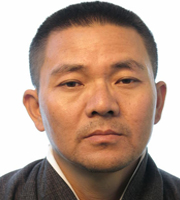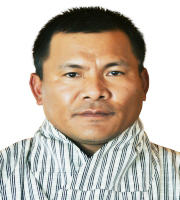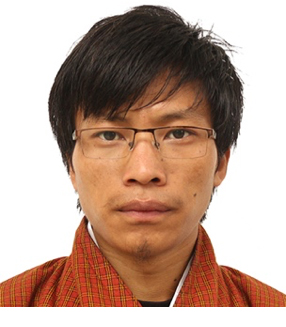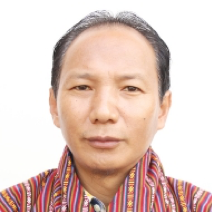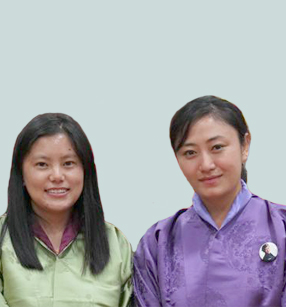Of so many wonderful memories of Gasa, one that stands out is the human element of a landmark place called Tongchudrak, midway between the Gasa-Laya trail. I am referring to Ap Khadip Phurba, who I regard as a larger-than-life personality. He claims - in fact, demands - both credit and compensation for making the direct (shortened) route possible. Single-handedly, his undivided, undying willpower, combined with ingenious skills in building dykes, he changed the river's course and built a makeshift bridge using hundred percent local materials. Like many, I also have succumbed to his claims, as the stark reality of the situation that one gets to experience first-hand on-site is a compelling one.
His is a story of how far the human spirit can go when will, determination, grit, and courage are in abundance. His is not a story of a mere mortal. That's why I respectfully call him Hercules - the Hercules of Tongchudrak. He displays the determination required to pursue one's goals and the necessary level of passion needed to achieve them. I cannot help but see his story as a showcase of "leadership of the self" - an emerging approach to "leadership" articulated succinctly in philosophy and practiced by our beloved King.
The Royal Institute of Governance and Strategic Studies (RIGSS[1]) in Phuentsholing, an Institute envisioned by His Majesty for molding Bhutanese into great leaders, has the following quote from His Majesty The Druk Gyalpo[2] as its guiding philosophy – “What we need is not a Leader to lead the Masses – we need Leadership of the Self.” This quote placed above the Prajna auditorium door overlooks the central lobby and welcomes anyone that enters through the main front gates leading to the reception.
I met Ap Khadip Phurba for the first time in June 2015. By then, he was already in his seventies. By any average measure, he was, without doubt, in the twilight years of his life. So he should be in some dark and dingy corner of a house with prayer beads in his hands, with toothless jaws in lazy motion chanting prayers. But that was not the path or place he chose for himself. His favorite place was upstream of the Mochu[3] river at Tongchudrak, which is about eight hours walk from the headquarters of Gasa[4] Dzongkhag[5] and about five hours from Laya[6].
For almost nine months in a year, rain or shine, with his lanky body knee-deep in the water, he single-handedly carried and placed stones, boulders, and logs along the middle of the river to build a diversion dyke. He wanted the dyke to change the river's natural course to shorten travel time by almost one hour. His mission was to make a favorable walking trail along the base of the great Tongchudrak rock face.
And yes, this indomitable task he had embarked upon gave me the real context to experience what a "Herculean Task" means. I have heard and even used this term on numerous occasions but never really got the feel of what it truly meant until this time. An old and withered man working to divert the course of a river single-handedly couldn't be anything but a Herculean task. And in his younger days, with his tall height and muscular build, he must have stood out from the rest.

His name is Phurba, but people jestingly call him Khadip Phurba, meaning Phurba the Stutterer. He stuttered on every word. Depending on the onlooker, it could be either painful or entertaining to see him seriously struggle to say a word or two clearly. I have not met a stauncher stutterer, but one could understand him correctly if one listened with heart. Most did not care to listen to him; he was rather taken as a joker. One could say that he was the least understood personality in Gasa Dzongkhag. In fact, from early on, I was advised by many well-wishers not to pay any heed to him because he could be a serious trouble maker. But somehow, my instinct told me otherwise, and our first meeting at Tongchudrak confirmed it.
He hails from Chongra in Laya Gewog[7]. He proudly describes his house’s location as the one next to the house that hosted Shabdrung Rimpoche[8] on his maiden entry to the country about 400 years ago. He lost his parents four decades ago and four of his six siblings over the years. He has a seventy-six-year-old elder sister. He was married for thirty years to a woman who was nine years younger than him. They did not have any children. For the last fifteen years, he has been a divorcee. His primary source of income is from his forty yaks, tended to by his nieces. He lives with one of his nieces, who has six children, but he spends most of his time in the waters of Mochu at Tongchudrak—pursuing his mission of diverting the river to a new course so that the travelers could walk along the dry base of the Tongchudrak cliff.
Based on local sources, the story of this Herculean task began some twenty-nine years ago in 1992. He was supposed to have submitted the need to raise a dyke along the river banks of Tongchudrak to facilitate the travelers at a meeting graced by His Majesty the Fourth Druk Gyalpo. It is said that in the meeting, His Majesty had remarked his submission as a good idea and that the Dzongkhag Administration should look into it. This Royal command was interpreted by Ap Phurba as an award of the dyke building works to him.
Since then, on and off, he has been working on this. He used his own resources for the work but received some cash compensation from the government. He approached various government authorities and personalities for additional compensation. The Dzongkhag administration could not help him any further as his modus operandi did not fulfill the necessary conditions for any official payments.
So from time to time, he approached VIPs like ministers, government secretaries, members of parliament, and other dignitaries in Thimphu, Gasa, and Tongchudrak, complaining about the incumbent Dzongda for not compensating his work and requesting their intervention. By 2016, he must have received compensation totaling Nu. 500,000, which was his original official claim. The most recent was a Soelra of Nu. 298,000 from His Majesty The King in August 2016, which was considered the final payment sealing all his claims. He, therefore, agreed not to pursue the matter any further.
But in the spirit of Hercules, he continued to approach authorities for compensation, despite signing the agreement. Some explain this unchanged appeal for compensation as a manifestation of his obsession with the place caused by the supernatural spirits of the locality. Locals jokingly remark that he is possessed by the supernatural spirits of the place. Whatever the truth may be, it is for sure that in the true spirit of Hercules, his unconditional devotion to the task at Tongchudrak will be upheld till the end of his earthly time.

I believe he is a perfect example of someone who exhibits "leadership of the self." He sees merits in his work at the Tongchudrak waters and therefore continues to work on it with full determination. I fully second the usefulness of that makeshift bridge that he improvised, as I have also crossed the river a number of times using it to shorten my travel time. Even the horses appear to be happier when not having to traverse the stretch over Tongchudrak rock.
He worked alone without any supervision. However, we cannot rule out the supernatural beings giving him company. Most of all, he did not seem to care for his life, considering the risks of working in these waters, especially at his age. Though I like to believe that we will never fully understand this larger-than-life personality, I can't help but think that he found the purpose of his life in serving others.
Today, with the motor road construction having reached Tongchudrak, his project for the last three decades is bound to become irrelevant. So, it will be interesting to hear what he has to say. When I met him in 2020, he did not mention anything on how this would impact his life's work, and I really could not gauge what his feelings were – a Happy or Helpless Hercules. Well, whatever his feelings, I think I prefer not to know them, but rather shout out loud in his praise: Long Live Hercules of Tongchudrak! May the spirit of "Leadership of the Self" flourish.
Miwang Ngadag Gyalpo Gyalo! Wangchuck Dynasty Gyalo! Palden Drukpa Gyalo!
[1] RIGSS – Royal Institute of Governance and Strategic Studies was established in 2013 under Royal Vision. Today it is regarded as a peerless institute in the country and at par with the best in the region.
[2] Druk Gyalpo – King of Bhutan
[3] Mochu river joins her male companion Phochu at a confluence just south of the Punakha Dzong, which then becomes the Punatsangchu and later empties into Brahmaputra river in Assam in India. The famous hot springs of Gasa is on the banks of Mochu at Gasa.
[4] Gasa – one of 20 districts in Bhutan
[5] Dzongkhag – District. Bhutan is divided into 20 districts.
[6] Laya – one of 4 Gewogs (blocks) of Gasa Dzongkhag. It is the venue for the annual Royal Highland Festival
[7] Gewog – Smallest administrative unit. Bhutan has 205 Gewogs
[8] Shabdrung Rimpoche – Founding father of Bhutanese state in 16th century (1594–1651)
